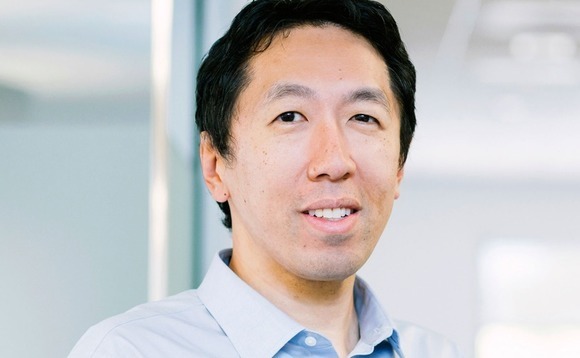
Q&A: AI Fund's Andrew Ng

After establishing artificial intelligence units for Google and Baidu, Andrew Ng famously declared AI “the new electricity” and launched AI Fund, an incubator with a $175 million war chest
Q: Can you explain the strategy with AI Fund?
A: We're building companies from scratch. I tell entrepreneurs, if you're on pitch deck, incorporated, or you have a team or an idea, you're too late stage for us. It's a half joke, but it's close. We have a lot of ideas internally that we try to do lightweight validation for. Then we bring on a founding team and matchmake ideas with entrepreneurs. We have about a dozen companies, most of which have not been announced publicly. One is Landing AI, which helps industry incumbents embrace AI. We also did a Series A with NEA [New Enterprise Associates] for Woebot, which is a digital mental health company.
Q: What trends are you seeing?
A: AI is causing more industries to become winner-take-most or winner-take-all. The general pattern is that the internet allows us to centralize data, and AI allows us to process the data, so the pendulum is swinging from decentralized decision-making to more centralized decision-making. The most important thing for [investors] to realize about AI is that it's infecting every industry, including those outside of software-internet. Now is the right time to make sure you place the right bets because in several years, if competitors are ahead, then they will capture the positive feedback loops causing these winner-take-all dynamics.
Q: Which industries stand out?
A: Industries that use more data tend to be a bit more AI-ready. For example, healthcare is pretty advanced in digitization. There are definitely short-term opportunities in healthcare in a two-year timeframe. Finance is very digital. In contrast, education is relatively less digital. Manufacturing is a bit further along. Agriculture is getting there. Eventually, it will be in everything, but I don't think it will be fast. There will also be a sequencing – but imagine 100 years ago sitting around trying to say what industry sectors will be the first to use electricity.
Q: What lessons can be learned from the uptake of electricity?
A: The first killer app for electricity was lighting. That transformed manufacturing because you could work at night. But the real transformation came when we rearchitected factories from steam engines to electric motors. Today, redesigning the taxi industry to use the internet is not a cab company with a website – it's ride-hailing. This is something that a lot of companies didn't understand a decade ago. They thought using the internet just meant building a website. Building an AI company means rethinking with the new capability what business activities still create value or are still defensible, as well as what activities should be outsourced, rearchitected, or just not done anymore. That will take time.
Q: What's your view on the talent pool tackling this challenge?
A: There's not enough. The junior levels of talent are starting to grow, but there's a huge shortage of people with, say, two or more years of experience. One of the hardest roles to find is an AI architect, the person who takes a look at a business case or business problem and decides what to do and what not to do. One of the challenges is that unless you have executives that know a little bit about AI, it's difficult to manage a team to drive execution. I've actually seen companies hire perfectly good AI people who have presented a good strategy, but the CEO didn't know how to recognize it and say go.
Q: What are the main misunderstandings?
A: People still have unrealistic expectations of what AI can do. In pharma, they think AI can discover drugs in a few years. A lot of automotive CEOs have had unrealistic expectations about self-driving. They stand on a stage announcing a roadmap, and then backstage after the talk, the engineers tell me it's not going to happen. There's sometimes that gap within a company. And there's an echo chamber where two or more CEOs announce something, and it just escalates. Sometimes, executives think it's not going to work, but it actually does. You can overestimate or underestimate the capabilities, and both can be significant errors.
Q: What is the risk of hype creating an AI bubble?
A: [SoftBank CEO] Masayoshi Son has this interesting chart about the dotcom crash, and guess what, it picked up because the fundamental was how much the internet was growing, not stock price fluctuations. Two years ago, you could slap an AI sticker on something, and its valuation would go up. I'm really happy we are past that phase. Share prices are a popularity contest, so if you care about how people vote, that's the short term. If you care about fundamentals and the weight of a company over time, then eventually a company will reflect the true value, and I think AI has true value.
Q: How else is sentiment impacting AI?
A: There are huge problems with ethics, but I'm not seeing that much resistance. In some countries, I see strong union opposition, even the blocking of small-scale AI pilots, but for the most part, it's not slowing down much because the market is fragmented. One of the mistakes we made with the rise of the internet was we created tremendous wealth, but it was very concentrated by geography and strata. With the rise of AI, I would love the wealth we create to be more fairly shared, and there's still room for multiple AI hubs to be built around the world. Right now, Silicon Valley and Beijing are ahead of everyone else, but other countries can still have a huge piece of the pie.
Q: Aren't the most robust ecosystems the best places to build companies?
A: As an investor you have to do something different to what everyone else is doing. I really see opportunities all around the world. For example, we're building a team in Colombia, which I think has a good shot of being the future of Latin American AI. We went there because of the talent pool – there's actually a good software engineering community. It has strong business ecosystem, friendly regulations, and good local partners that are willing to help farm-in companies like us. We spent a lot of time figuring out where to set up our first satellite office, and after a six-month exercise, we chose them.
Latest News
Asian GPs slow implementation of ESG policies - survey
Asia-based private equity firms are assigning more dedicated resources to environment, social, and governance (ESG) programmes, but policy changes have slowed in the past 12 months, in part due to concerns raised internally and by LPs, according to a...
Singapore fintech start-up LXA gets $10m seed round
New Enterprise Associates (NEA) has led a USD 10m seed round for Singapore’s LXA, a financial technology start-up launched by a former Asia senior executive at The Blackstone Group.
India's InCred announces $60m round, claims unicorn status
Indian non-bank lender InCred Financial Services said it has received INR 5bn (USD 60m) at a valuation of at least USD 1bn from unnamed investors including “a global private equity fund.”
Insight leads $50m round for Australia's Roller
Insight Partners has led a USD 50m round for Australia’s Roller, a venue management software provider specializing in family fun parks.







